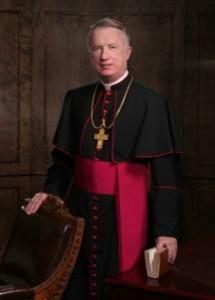|
Morrisey explains reasoning behind consumer protection suit against Wheeling-Charleston diocese
By Aalex Wiederspiel
State Attorney General Patrick Morrisey said the civil suit against the Diocese of Wheeling-Charleston, filed in the wake of a child sexual abuse scandal, is narrowly focused on consumer protection violations. “When you’re offering up an item or a service and you are paying tuition for it, people expect that the promises that are getting made will actually get delivered,” Morrisey said on WAJR’s “Talk of the Town” with Dave Wilson and Sarah Giosi. “Our complaint pointed out for a very prolonged period of time — really going back many decades — that the services that were in fact offered weren’t delivered.” “The students were effectively promised a safe environment,” he continued, “but when you knowingly employ pedophiles and fail to undertake background checks and you’re not being transparent, then that ultimately puts you in jeopardy of our consumer protection laws.” The Dallas Charter of 2002 was meant to offer reforms and protection following the lengthy investigation into Boston-area sex abuse scandals by The Boston Globe. Morrisey claims the actions of the Diocese in response to reports of sexual abuse by priests and other Diocese employees represents a consumer protection violation — and a failure to uphold those reforms. “In spite of the new practices that the church announced back in the early 2000’s, they didn’t follow through on those and that’s obviously a real concern,” he said. Morrisey said the Diocese’s goals should be in line with his office’s — increased transparency, more effective and efficient background checks for teachers and employees, and equal treatment of all allegations against priests and bishops alike. “If the church were to step forward and agree with the goals that we have, then obviously the sooner that happens the quicker we can bring a lot of this to an end,” Morrisey said. The civil complaint said the Diocese and its bishops, including Michael Bransfield, chose to cover up and conceal possible criminal behavior of child sexual abuse. It outlined several examples of how the Diocese knowingly employed admitted sexual abusers, priests credibly accused of child sexual abuse, and hired others without adequate background checks. It cited a specific instance of a known pedophile who had pleaded guilty to statutory rape that the Diocese hired and who proceeded to teach for two years at Madonna High School before a background check was conducted and discovered his past convictions. If evidence of wrongdoing is gathered during the investigation, Morrisey said criminal matters will be referred to local prosecutors. “Local prosecutors can make the decision as to whether to charge someone with a criminal violation, but we don’t have that specific authority in the office,” Morrisey said. “Obviously, that’s one of the reasons why we zero in on the consumer protection laws.” The Diocese has said it is “addressing” the litigation — releasing the following statement to MetroNews last week. “The Diocese strongly and unconditionally rejects the Complaint’s assertion that the Diocese is not wholly committed to the protection of children, as reflected in its rigorous Safe Environment Program, the foundation of which is a zero tolerance policy for any cleric, employee or volunteer credibly accused of abuse. The Program employs mandatory screening, background checks and training for all employees and volunteers who work with children.
|
.
Any original material on these pages is copyright © BishopAccountability.org 2004. Reproduce freely with attribution.
